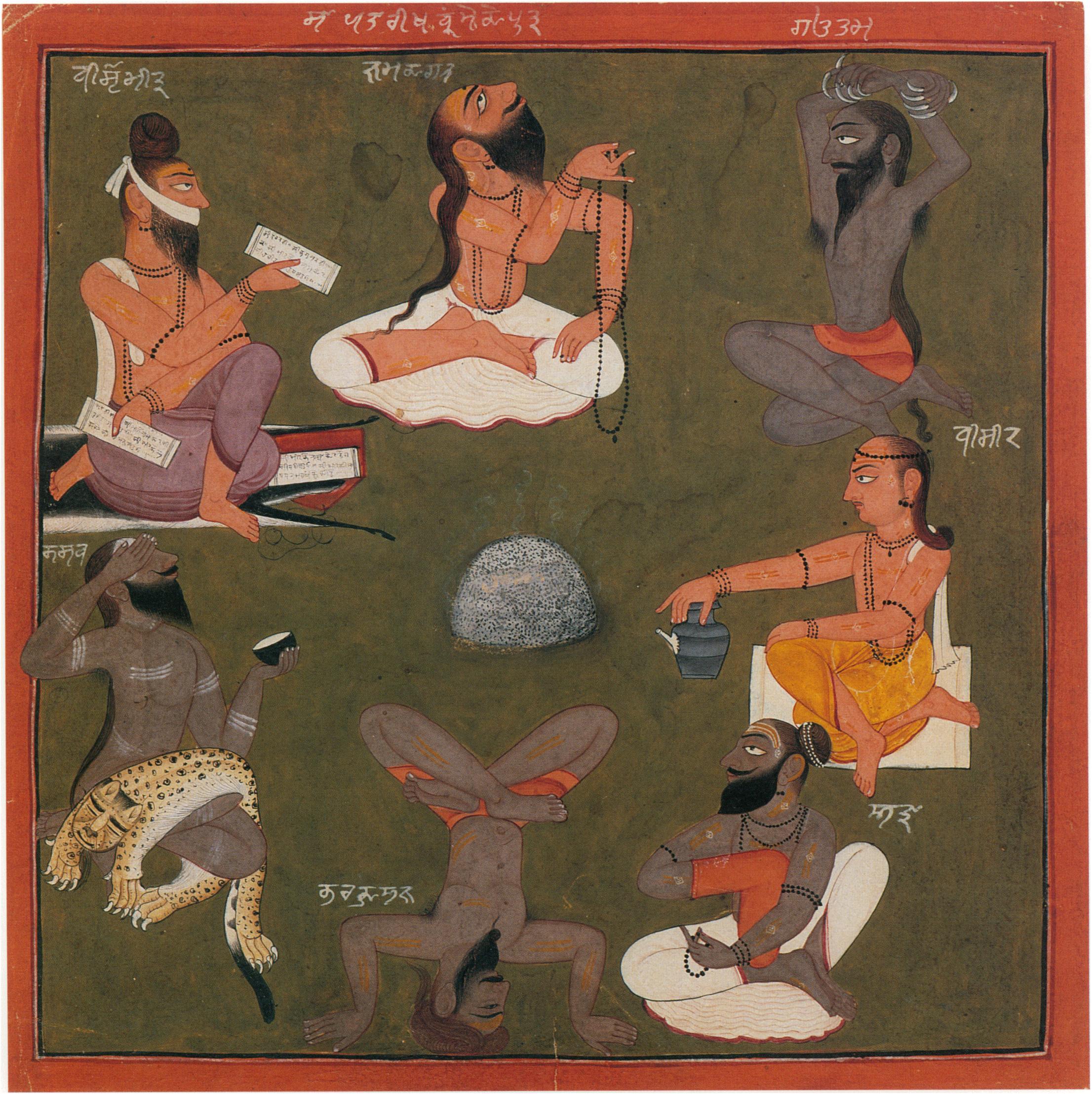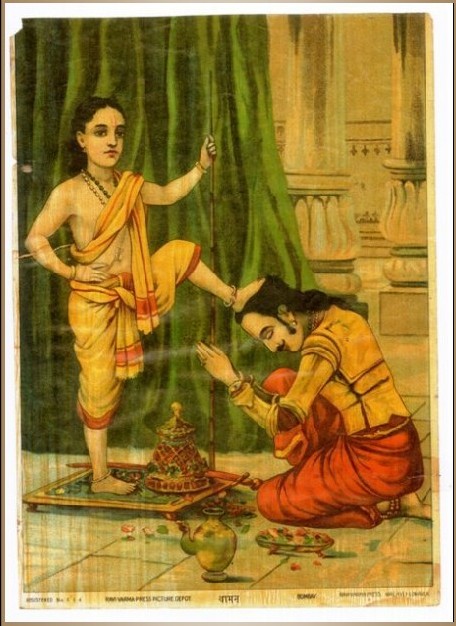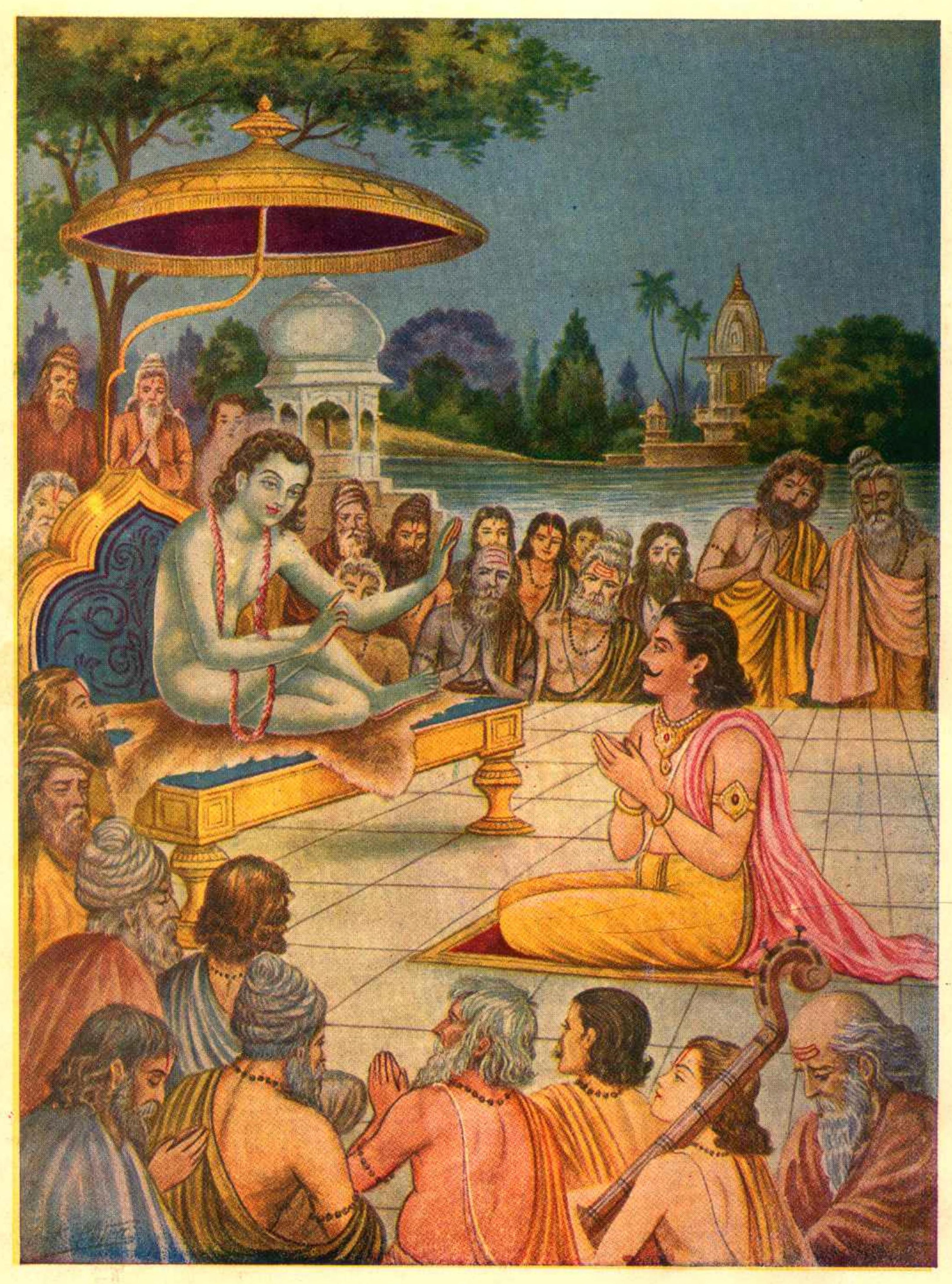|
Savarni Manu
Savarni Manu () is the eighth Manu, the first man of an age known as the Manvantara in Hindu mythology. Literature The Vishnu Purana specifies fourteen Manus. The Manu of the present age is called Vaivasvata Manu, the seventh man to hold the title. He is to be succeeded by his half-brother Sarvabhauma, who would be called the Savarani Manu. The eighth Manu is described to be born to Surya, the god of the sun, and Chhaya, one of his consorts. The authorship of the Brahma Vaivarta Purana is attributed to this Manu, who narrates its contents to Narada. According to the Srimad Bhagavatam, Savarni's sons are stated to be Nirmoka, Virojaksha, and unnamed others. During his reign, the deities of Surya and Vishnu are stated to be venerated. Bali, the son of Virochana, is described to rule as king. Galava, Diptiman, Ashvatthama, Kripa, Rishyashringa, Vadrayana, and Parashurama Parashurama (), also referred to as Rama Jamadagnya, Rama Bhargava and Virarama, is the sixth ava ... [...More Info...] [...Related Items...] OR: [Wikipedia] [Google] [Baidu] [Amazon] |
Manu (Hinduism)
Manu () is a term found with various meanings in Hinduism. In early texts, it refers to the archetypal man, or the first man ( progenitor of humanity). The Sanskrit term for 'human', मनुष्य (IAST: manuṣya) or मानव (IAST: mānava) means 'of Manu' or 'children of Manu'. In later texts, Manu is the title or name of fourteen rulers of earth, or alternatively as the head of dynasties that begin with each cyclic '' kalpa'' (aeon) when the universe is born anew. The title of the text ''Manusmriti'' uses this term as a prefix, but refers to the first Manu – Svayambhuva, the spiritual son of Brahma. In the Hindu cosmology, each ''kalpa'' consists of fourteen Manvantaras, and each Manvantara is headed by a different Manu. The current universe, is asserted to be ruled by the 7th Manu named Vaivasvata. Vaivasvata was the king of Dravida before the great flood. He was warned of the flood by the Matsya (fish) avatar of Vishnu, and built a boat that carried the Vedas, ... [...More Info...] [...Related Items...] OR: [Wikipedia] [Google] [Baidu] [Amazon] |
Narada
Narada (, ), or Narada Muni, is a sage-divinity, famous in Hinduism, Hindu traditions as a travelling musician and storyteller, who carries news and enlightening wisdom. He is one of the Manasputra, mind-created children of Brahma, the creator god. He appears in a number of Hindu texts, notably the Mahabharata, telling Yudhishthira the story of Prahlada, Prahalada, and he also appears in the Ramayana and the Puranas. A common theme in Vaishnavism is the accompaniment of a number of deities such as Narada to offer aid to Vishnu upon his descent to earth to combat the forces of evil, or to enjoy a close view of epochal events. He is also referred to as ''Rishiraja'', meaning the king of all sages. He was gifted with the boon of knowledge regarding the past, present, and the future. Hinduism In Indian texts, Narada travels to distant worlds and realms (Sanskrit: ''lokas''). He is depicted carrying a khartal (musical instrument) and the veena, and is generally regarded as one of ... [...More Info...] [...Related Items...] OR: [Wikipedia] [Google] [Baidu] [Amazon] |
Characters In The Bhagavata Purana
Character or Characters may refer to: Arts, entertainment, and media Literature * ''Character'' (novel), a 1936 Dutch novel by Ferdinand Bordewijk * ''Characters'' (Theophrastus), a classical Greek set of character sketches attributed to Theophrastus Music * ''Character'' (Dark Tranquillity album), 2005 * ''Character'' (Julia Kent album), 2013 * ''Character'', an album by Rachael Sage, 2020 * ''Characters'' (John Abercrombie album), 1977 * ''Characters'' (Stevie Wonder album), 1987 * "Character", a song by Ryokuoushoku Shakai, 2022 Types of entity * Character (arts), an agent within a work of art, including literature, drama, cinema, opera, etc. ** Character actor, an actor known for playing unusual, eccentric or interesting characters in supporting roles ** Character sketch or character, a literary description of a character type * Game character (other), various types of characters in a video game or role playing game ** Player character, as above but who is c ... [...More Info...] [...Related Items...] OR: [Wikipedia] [Google] [Baidu] [Amazon] |
Saptarishi
The Saptarshi ( ) are the seven seers of ancient India who are extolled in the Vedas, and other Hindu literature such as the Skanda Purana. The Vedic Samhitas never enumerate these rishis by name, although later Vedic texts such as the Brahmanas and Upanisads do, so these constellations are easily recognizable. Hindu sacred text An early prototype of the "Saptarishi" concept may stem from the six families associated with the six "Family Books" in the Rigveda Samhita (Mandalas 2–7 in ascending order: Gṛtsamāda, Viśvāmitra, Vāmadeva, Atri, Bharadvaja, Vasiṣṭha). While not a "Family Book", Mandala 8 is mostly attributed to Kaṇva, who could be considered the 7th prototypical Saptarishi. The earliest formal list of the seven rishis is given by Jaiminiya Brahmana 2.218–221: Agastya, Atri, Bhardwaja, Gautama, Jamadagni, Vashistha, and Vishvamitra followed by Brihadaranyaka Upanisad 2.2.6 with a slightly different list: Atri, Bharadvaja, Gautama ... [...More Info...] [...Related Items...] OR: [Wikipedia] [Google] [Baidu] [Amazon] |
Parashurama
Parashurama (), also referred to as Rama Jamadagnya, Rama Bhargava and Virarama, is the sixth avatar among the Dashavatara of the preserver god Vishnu in Hinduism. Hindu tradition holds him to be the destroyer of the evil on Earth. According to legends, Shiva advised him to go and liberate the Mother Earth from felons, ill-behaved men, extremists, demons and those blind with pride. He is described as one amongst the ''Chiranjivi, Chiranjivis'' (Immortals), who will appear at the end of the ''Kali Yuga'' to be the guru of Vishnu's tenth and last incarnation, Kalki. Born to Jamadagni and Renuka, the Brahmin Parashurama was foretold to appear at a time when overwhelming evil prevailed on the earth. The Kshatriya class, with weapons and power, had begun to abuse their power, take what belonged to others by force and tyrannise people. He corrected the cosmic equilibrium by destroying these Kshatriyas twenty-one times (leaving some lineages). He is married to Dharani, an incarnatio ... [...More Info...] [...Related Items...] OR: [Wikipedia] [Google] [Baidu] [Amazon] |
Rishyasringa
Rishyasringa (; ; Pali: Isisiṅga) is a rishi mentioned in Hindu and Buddhist scriptures from the late first millennium BCE. According to the Hindu epics ''Ramayana'' and ''Mahabharata'', he was a boy born with the horns of a deer who became a seer and was lured by royal courtesans, which led to the yajna (fire sacrifice) of King Dasharatha. His story also occurs in the Buddhist Jatakas, where he is mentioned as the son of Bodhisatta and was tried to be seduced by royal courtesans. Hindu legends The story of Rishyasringa briefly appears in the ''Ramayana'', while a detailed account is narrated in the ''Mahabharata''. Birth According to the ''Mahabharata'', Vibhandaka, a renowned sage and a son of Kashyapa, travels in Mahahrada, when he sees Urvashi, the most beautiful apsara (nymph). Aroused, he emits his seed, which fell into the river. A doe, who is a cursed apsara, swallows it and becomes pregnant due to the sage's miraculous powers. After she gives birth to a boy, she ... [...More Info...] [...Related Items...] OR: [Wikipedia] [Google] [Baidu] [Amazon] |
Kripa
Kripa (, ), also known as Kripacharya (, ), is a figure in Hindu mythology. According to the epic '' Mahabharata'', he was a council member of Kuru Kingdom and a teacher of the Pandava and Kaurava princes. Born to warrior-sage Sharadvan and ''apsara'' Janapadi in an extraordinary manner, Kripa and his twin-sister Kripi were adopted by King Shantanu of Kuru Kingdom. Kripa was trained by his birth father and became a great archer like him. Later in the epic, he fought on the Kauravas's side against the Pandavas in the Kurukshetra war and was among the three survivors on the Kaurava side, along with Ashwatthama and Kritavarma. Kripa is a '' chiranjivi'', an immortal being destined to live until the end of the '' Kali Yuga'', the last '' yuga'' (age). According to some texts, he will also become one of the '' Saptarishi''—the seven revered sages—in the next ''Manvantara'', which is a cyclic period of time in Hindu cosmology. Names The Sanskrit word Kripa ('' Kṛpa'') ... [...More Info...] [...Related Items...] OR: [Wikipedia] [Google] [Baidu] [Amazon] |
Ashwatthama
Ashvatthama (, , also spelt as Ashwatthama and Ashvatthaman) is a character in the ancient Hindu epic ''Mahabharata''. He is the son of Drona, the royal preceptor to the Kuru princes—the Pandavas and the Kauravas. Ashvatthama is a close companion of Duryodhana, the leader of the Kauravas, and receives military training alongside the Kuru princes under the tutelage of his father. Favoured by his father, Ashvatthama is entrusted with the knowledge of several celestial weapons, including the Narayanastra and the Brahmashirastra. During the Kurukshetra War between the Pandavas and the Kauravas, he fights on the side of the Kauravas and emerges as one of the three surviving warriors from their faction by the war’s conclusion. On the night following the eighteenth day of battle, after the war has formally concluded, Ashvatthama launches a night raid on the Pandava camp. He kills Dhrishtadyumnathe commander-in-chief of the Pandava army, who beheaded Drona during the warand ... [...More Info...] [...Related Items...] OR: [Wikipedia] [Google] [Baidu] [Amazon] |
Virochana
Virochana () is an asura king in Hinduism. He is the grandson of Hiranyakashipu, the son of Prahlada (according to the Atharvaveda The Atharvaveda or Atharva Veda (, , from ''wikt:अथर्वन्, अथर्वन्'', "priest" and ''wikt:वेद, वेद'', "knowledge") or is the "knowledge storehouse of ''wikt:अथर्वन्, atharvans'', the proced ... (VIII.10.22), and the father of Mahabali, Bali. Legend Being the son of Prahlada, a staunch devotee of Vishnu, Virochana is raised to be religious, performing rites and rituals with care. He is stated to be kind towards Brahmin, Brahmins. In the Mahabharata, Vidura recounts the tale of Virochana and Sudhanva, the son of Sage Angiras. During the svayamvara of a beautiful princess called Kesini, the asura prince was asked to state if Brahmins were superior to the Daitya, daityas. Being a daitya himself, Virochana replied that the daityas were superior, due to the worlds being under their suzerainty. ... [...More Info...] [...Related Items...] OR: [Wikipedia] [Google] [Baidu] [Amazon] |
Mahabali
Mahabali (IAST: Mahābalī), also known as Bali, Indrasenan, or Māveli, is a daitya king featured in Hinduism. He is the grandson of Prahlada, and a descendant of the sage Kashyapa. There are many versions of his legend in ancient texts such as the '' Shatapatha Brahmana'', ''Ramayana'', ''Mahabharata'', and several ''Puranas''. According to Hindu literature, he was blessed to be one of the Chiranjivi, a group of seven immortals, by the Vamana avatar of Vishnu and reigns in the Sutaloka. It is believed that Mahabali will become the King of Svarga (heaven) in the next '' yuga''. In Kerala, Mahabali is considered to be the noblest and most prosperous ruler, who transformed his kingdom into a heavenly place. His legend is a major part of the annual festival Onam in the state of Kerala, and it is celebrated in Maharashtra, Karnataka, Gujarat, Telangana, and Andhra Pradesh as Balipratipada, Balipādyami, or Bali pādva (the third day of Deepavali and first day of Kartika ... [...More Info...] [...Related Items...] OR: [Wikipedia] [Google] [Baidu] [Amazon] |
Vishnu
Vishnu (; , , ), also known as Narayana and Hari, is one of the Hindu deities, principal deities of Hinduism. He is the supreme being within Vaishnavism, one of the major traditions within contemporary Hinduism, and the god of preservation (sattva). Vishnu is known as ''The Preserver'' within the Trimurti, the triple deity of Para Brahman, supreme divinity that includes Brahma and Shiva.Gavin Flood, An Introduction to Hinduism' () (1996), p. 17. In Vaishnavism, Vishnu is the supreme Lord who creates, protects, and transforms the Hindu cosmology, universe. Tridevi is stated to be the energy and creative power (Shakti) of each, with Lakshmi being the equal complementary partner of Vishnu. He is one of the five equivalent deities in Panchayatana puja of the Smarta tradition of Hinduism. According to Vaishnavism, the supreme being is with qualities (Saguna Brahman, Saguna), and has definite form, but is limitless, transcendent and unchanging absolute Brahman, and the primal Atma ... [...More Info...] [...Related Items...] OR: [Wikipedia] [Google] [Baidu] [Amazon] |
Bhagavata Purana
The ''Bhagavata Purana'' (; ), also known as the ''Srimad Bhagavatam (Śrīmad Bhāgavatam)'', ''Srimad Bhagavata Mahapurana'' () or simply ''Bhagavata (Bhāgavata)'', is one of Hinduism's eighteen major Puranas (''Mahapuranas'') and one of the most popular in Vaishnavism. Composed in Sanskrit and traditionally attributed to Veda Vyasa, it promotes '' bhakti'' (devotion) towards Krishna, an avatar of Vishnu, integrating themes from the Advaita (monism) philosophy of Adi Shankara, the Vishishtadvaita (qualified monism) of Ramanujacharya and the Dvaita (dualism) of Madhvacharya. It is widely available in almost all Indian languages. The ''Bhagavata Purana'', like other puranas, discusses a wide range of topics including cosmology, astronomy, genealogy, geography, legend, music, dance, yoga and culture. As it begins, the forces of evil have won a war between the benevolent '' devas'' (deities) and evil '' asuras'' (demons) and now rule the universe. Truth re-emerges as ... [...More Info...] [...Related Items...] OR: [Wikipedia] [Google] [Baidu] [Amazon] |







